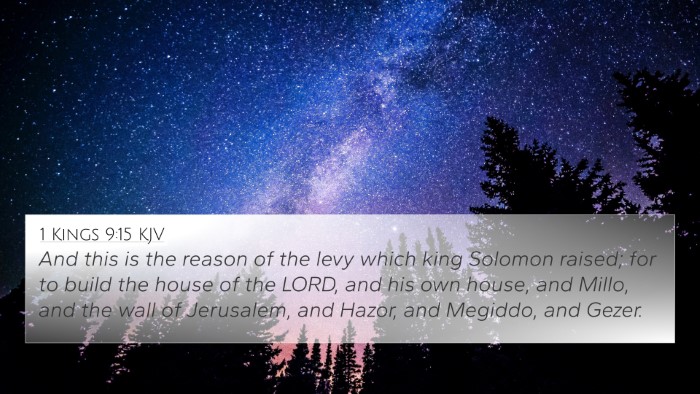Understanding 2 Samuel 5:9
2 Samuel 5:9 states, "And David dwelt in the fort, and called it the city of David: and David built round about from Millo and inward." This verse marks a significant moment in David's reign as it highlights his establishment of Jerusalem as the capital of Israel, referred to here as the "City of David." Below, we summarize insights from public domain commentaries to enhance the understanding of this verse.
Context and Significance
The verse takes place after David is anointed king over all Israel, consolidating his power and uniting the tribes. His choice of Jerusalem as the capital is pivotal in Israel's history, emphasizing themes of unity and divine providence in David's leadership.
The Significance of Jerusalem
According to Matthew Henry, the selection of Jerusalem signifies a new beginning for the united kingdom of Israel, as it was not previously owned by any tribe but was strategically located between both the northern and southern tribes. Henry notes that this city becomes central in Israel’s worship of God and in later biblical events.
David's Establishment of Power
Albert Barnes emphasizes that David’s building efforts demonstrate his commitment to fortifying the city and establishing a permanent royal presence. The mention of Millo refers to a part of Jerusalem that is fortified, showing David’s zeal for defense and security for his people.
Theological Perspectives
Adam Clarke interprets David’s actions as both practical and symbolic. By fortifying Jerusalem and naming it after himself, Clarke suggests that David was acknowledging God's promise to establish his house and lineage. Thus, this verse has theological implications regarding God’s covenant and the importance of leadership in following divine purpose.
Cross-Referencing Related Bible Verses
To deepen the understanding of 2 Samuel 5:9, here are some relevant cross-references that highlight themes of leadership, divine selection, and the significance of Jerusalem:
- 1 Chronicles 11:4-9 - Details David's conquest of Jerusalem and its establishment as the capital.
- 2 Samuel 6:12-15 - Discusses David bringing the Ark of the Covenant to Jerusalem, signifying God’s presence.
- Psalm 132:13-14 - Affirms God’s choice of Zion for His dwelling place.
- Isaiah 2:3 - Predicts Jerusalem as the center for teaching and guidance.
- Matthew 5:35 - Highlights the city of Jerusalem’s significance in the New Testament context.
- Luke 2:4 - References David's lineage in connection with Jesus’ birth in Bethlehem, linking the Old and New Testaments.
- Hebrews 7:14 - Explores Jesus' priestly lineage from Judah, reinforcing David's importance.
Themes and Interpretations
Multiple themes arise from David’s establishment of Jerusalem as the capital. These include:
- Leadership and Governance: David exemplifies a leader chosen by God, uniting the tribes of Israel and establishing a city that would become central to worship and community.
- Divine Providence: His rise to power and the establishment of Jerusalem demonstrate God’s hand in guiding the nation.
- Legacy and Heritage: The city would be known by David's name, signifying his lasting impact on Israel’s identity.
Tools for Further Study
For those interested in exploring the connections within the Bible further, consider utilizing:
- Bible Concordance: A helpful tool for finding specific verses and themes.
- Bible Cross-Reference Guide: A systematic approach to exploring interconnections between texts.
- Coding Themes in the Bible: Engaging in cross-referencing studies deepens one’s understanding of Biblical narratives and characters.
Conclusion
2 Samuel 5:9 is more than a historical note; it encapsulates pivotal themes in Israel's identity, divine purpose, and the importance of Jerusalem. By examining it through various commentaries and exploring related cross-references, one gains profound insights into both the text and its larger implications throughout the scriptures.










